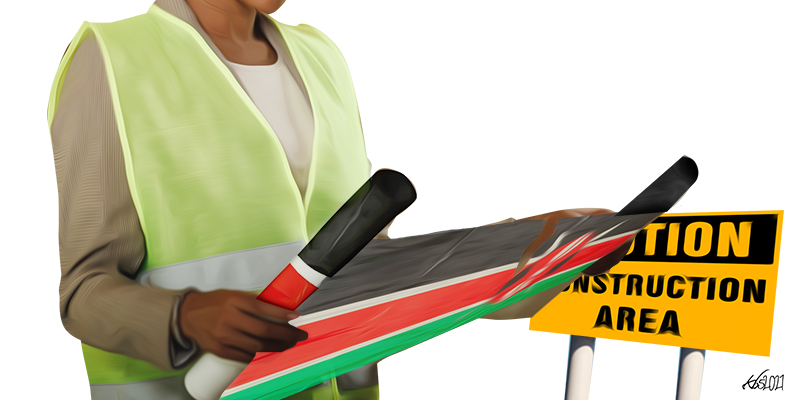The Berlin Conference of 1886 set the forces responsible for creating the map of modern Africa in motion. This demarcation of the continent by colonial interests resulting in the consolidation of spaces on a map into countries was for the most part an arbitrary exercise. It resulted in the formation of a wide-ranging set of artificial nation states. Kenya and most other African nations are, by this definition, historical accidents.
The colonial cookie cutter changed everything, rerouting resources and labour into new avenues with new beneficiaries, rewiring the system of production and exchange in fundamental ways. All of this had massive consequences for populations falling within their borders, and beyond. Ironically, imposing a Eurocentric version of the central state turned out to be even more disruptive for what were arguably the Greater Horn of Africa’s more organically constituted units like Somalia, the intra-lacustrine region, and the former Kingdoms in Rwanda and Burundi.
Africa’s colonial reorganisation, by the standards of historical conquest and exploitation, was short-lived. In some pockets, it acted as an accelerator where its benefits have outlived its negative impacts, for the most part. In others, the disruption and confusion engendered still appear to be a permanent condition. In all cases, colonialism provided the context for the problems that came afterwards, diverting blame for the continent’s issues to external forces and actors when convenient.
This is one way of looking at Africa’s state at this point in time. But what if we look closer, and dig deeper? We are now in the territory of complex systems science, which has demonstrated the influence of initial conditions on any given system’s pathway over time. Colonialism articulated within other parameters such as the natural contours of geography, spatial factors, demographic conditions, and other variables that account for the region’s long-term historical trajectories.
Maybe the accident is not so accidental. A certain regression back to the African mean has been observable over the past several decades, giving rise to the counter-factual hypothesis that a different historical trajectory sans colonial intervention would have likely produced a similar configuration of political units, marked by the same initial conditions in the form of demographic, environmental, and technological parameters.
The localised nature of political organisation and the isolation of many areas of the continent would still have ended up acting as an entry point for outside interference and domination by invaders speaking different languages and representing other civilisations. Computer simulations modelled on the same system parameters would no doubt inscribe developmental pathways not so different from the one now prevailing. The end result would still be the rise of an economic and political elite, albeit perhaps not the product of formal education based on the Western mindset, because the emergence of state organisation is in any case an eventuality that has been occurring in Africa according to its own historical patterning since pharaonic times.
This is one point. The other is that countries sharing a given region or sector tend to converge once during periods of transition. The influence of initial conditions becomes more pronounced during these episodes, which by definition appear chaotic because they involve the break-up and reconfiguration of the system’s units and linkages. This has been occurring in clear sight during the current shift from an agrarian to a diversified, multi-sectoral economy in Kenya.
The process of change is accelerating apace at this juncture, telescoping internal changes that occurred over several centuries in other parts of the world and within several generations in Africa. The significance of Kenya’s transition transcends its borders because, due to whatever accidents of the past hundred years, its transformation will influence developments elevating the synergies of the larger region.
According to this thought experiment, the conventional analyses and the assumptions they are based on are no longer as compelling as they were during the heyday of radical political economy praxis. Despite the revival of the colonialism argument by millennial commentators who are trying to make sense of the economic cul-de-sac they find themselves in, the decolonisation narrative is not an issue for most of the region’s economically active population.
Decolonisation and reorganisation
We can nevertheless carry Franz Fanon’s diagnosis forward with a view towards anticipating the emergence of a new Africa more aligned with the region’s initial conditions, and hosting a distinctively African capitalism. We are actually witnessing these processes occur before our eyes. The turbulence erupting across the Horn will hopefully prove to be a necessary part of the larger transformational dynamic at work.
The process is sufficiently advanced to make some of us believe that countries like Kenya and others on the global periphery are positioned to make a vital contribution to the planet’s salvation. But sorting out the nation’s internal order is a prerequisite for achieving this station, and progress towards this point is in danger of stalling.
During the past two decades, Accidental Kenya has entered the territory of the release phase, as detailed in analyses about the Moi transition and the reorganisation taking form in its wake. The analyses were based on a developmental cycle comprising four phases: exploitation, consolidation, release, and reorganisation leading to a new cycle. There is no guarantee societies undergoing such phase transitions will complete the process. They can retreat to the previous state and stagnate, break-up, or even collapse—as was the fate of previous African civilisations.
After decades of hard-fought effort to decentralise decision-making and redistribute institutional governance, the executive branches of government in this part of the world are doing everything they can to reconcentrate decision-making power in the centre. Rwanda has already become an exemplar of the elite-controlled surveillance state.
The benefits of political decolonisation are typically usurped by other actors, and its role replaced by new forces. The decision to build a railway to the source of the Nile to protect the shipping route to India set in motion a chain of reactions that continues up to the present. A deeper form of decolonisation than self-rule will be needed to initiate a new cycle.
The big fix deception
“If it’s broken, just get under the hood and fix it.” So went the rallying cry for billionaire Ross Perot’s 1992 presidential candidacy (“hood” refers to the bonnet of an automobile). It helped make his on-and-off campaign the most successful third party run in the United States since 1912. More significantly, the notion of “just fixing” the “broken” political system became a meme that has resonated ever since, providing a gaping entry point for the politics of restoration championed by the likes of Jair Bolsonaro, Narendra Modi, and Donald Trump.
Systems of governance can be repaired, but can politicians fix them? It seems the more we depend upon them, the bigger the problem. In Kenya, for example, a submission to the recent court of appeal deliberations on the latest scheme to fix Accidental Kenya described our politicians as “job seekers who stand for nothing”. The description, strictly speaking, is not accurate: those often capricious Kenyan “job seekers” actually represent the entrenched tradition of pursuing personal accumulation by any means available.
Rwanda has already become an exemplar of the elite-controlled surveillance state.
This goes to the beating heart of Kenya’s colonial legacy, which endorsed the exploitation of Accidental Kenya by a numerically small elite committed to the creation of a capitalist political order. Small cliques of individuals have been in the business of applying fixes ever since the country’s creation. During the formative period, the administration established this by passing a comprehensive set of statutes limiting preferential access to land and markets for agricultural production.
After independence, Jomo Kenyatta endorsed the primacy of opportunistic accumulation when he castigated former Mau Mau fighter Bildad Kaggia for not grabbing the fruits of political independence like Paul Ngei and many of his other colleagues in the fight for independence. The unbalanced relationship between accumulation and the public good has persisted because the great majority of Kenyans endorsed the unbounded quest for private wealth in both principle and practice.
Independence in 1963 allowed Kenyans to participate in the economy established by colonial exploitation, the accumulation and resulting growth resulting in the consolidation of its accidental formation. The release phase highlighted the breakdown of the colonial-designed, state-centric economic order, and was accompanied by an unprecedented feeding frenzy triggered by World Bank and IMF-mandated privatisation of public land and other resources.
The trauma eventually led to the comprehensive reforms demanded by a mobilised and increasingly militant cross-section of the nation’s citizens. This opened the way for the long and tortuous process of public participation and political deal-making culminating in the 2010 Constitution. Anointed with the blood of citizens, the new charter signalled the onset of a fundamental reorganisation of Kenyan society and an economy attuned to the challenges facing future generations. It opened the door for the nation to seek its real post-colonial destiny.
A bridge too far
Kenyan political power relations being what they are, it only took one electoral cycle for the job seekers to decide they needed to “get under the hood and fix it” once again. Renewal got sidetracked into the Building Bridges Initiative, launched with the full resources of the government behind it. BBI in turn gave rise to the noise unleashed by the Uthamaki-Hustler narrative, which obscured the fact that the fix was actually a top-heavy Chinese political model clothed in the language of magical developmental thinking.
The circus accompanying these developments attempted to conjure up the illusion that BBI and its quasi-legitimisation by county legislatures were post-reform steps forward needed to resolve, once and for all, the nation’s most fundamental divisions that fall beyond the scope of the new Constitution.
The gambit to fix what is regarded as one of the most well-thought-out constitutions of the contemporary era became the source of one of those dangerous month-of-August Kenyan moments. Once again, a few gallant individuals came to the rescue. The judgements delivered by Kenya’s High Court and Court of Appeal, and Judge Kiage’s critique of executive bad faith rescued another generation from being trapped inside Accidental Kenya.
Small cliques of individuals have been in the business of applying fixes ever since the country’s creation.
Judge Kiage’s deconstruction of the BBI juggernaut bundled together the wisdom of Western jurisprudence with key historical interpretations of society and governance. His robust application of these sources to expose the bad faith characterising Kenya’s top-down fixology was perhaps the most powerful defence of democracy the world has witnessed since the rise of Trumpism.
The Court of Appeal secured the integrity of the 2010 Constitution for the time being, but there is no reason to expect the leadership at the top here and in neighbouring countries to change course in regard to their usual transactional goals and their quest to remain in power.
The nation-state in its current form has proven poorly adapted to the distinctive features of sub-Sahara Africa, and the political class will continue to enjoy the relative autonomy conferred by the state due to its position in the international system of nation states, its relationship to the Western military intelligence networks, and the temporary largesse of Xi Jinping’s Chinese chequebook—for the time being.
The quest for autonomy
The international order based on nation-states is not going away, even though its civilisational operating system has clearly reached its limits with respect to ensuring the planet’s survival over the longue durée. The majority of people on Planet Earth will nevertheless continue to follow their social media, the news fed to them by the usual suspects, and their appetites for material consumption while the signs and omens of the changing climate and its ramifications manifest around them.
The African state may look the same at the top, but it is part of a larger, complex system that has been evolving in the presence of systemic stressors. The sequence of developments over the post-independence period that appears indicative of dysfunction and incapacity and incoherence from without camouflages massive shifts occurring within.
This is the backdrop to Judge Kiage’s reminder that a constitution is “not a mechanical statute but the mirror of a nation’s soul.”
Kenya has progressed through a series of calamities including economic shocks, an attempted military coup, droughts and famines, unprecedented population growth, the politics of secession, ethnic insurgencies, terrorist attacks, grand corruption, devastating El Nino rains, desert locust invasions, privatisation from above and other inappropriate policies, and the HIV and coronavirus pandemics.
The gambit to fix what is regarded as one of the most well-thought-out constitutions of the contemporary era became the source of one of those dangerous month-of-August Kenyan moments.
We all come of age doped up on something. Then we pick up all kinds of baggage as we move on. Decolonisation in this context, involves adopting a forward-looking orientation transcending the accidental circumstances of our individual and collective upbringing.
This form of decolonisation synchs with the growing movement across the world striving to combine our scientific, technological, anthropological, ecological and other knowledge traditions with our direct experience of the sacred in order to transcend the accidents that create a new civilisational operating system. The advocates of this movement in my homeland refer to it as GameB. The content of GameB deserves its own discussion, but for the time being we can note that Kenyan society is already a player in this movement.
The Muslim poet and mystic Rumi said, “In the beginning I wanted to change the world, but then I realised the only thing I can do is change is myself.”
This is where we are right now. Nation-building in Kenya begins with creating a community of diverse communities. Wandia Njoya set the ball rolling in her insightful essay on Kenya’s twisted educational system by telling us we can start “by learning to love our children.”








